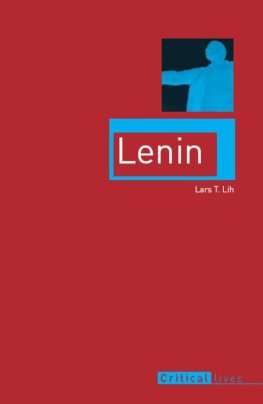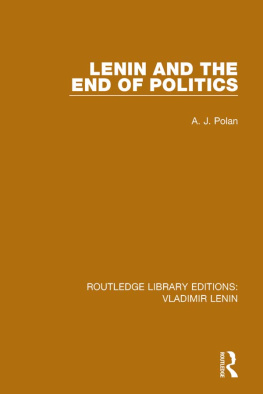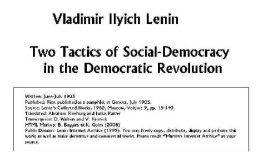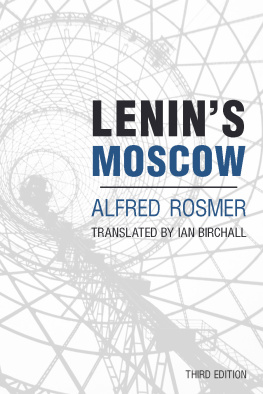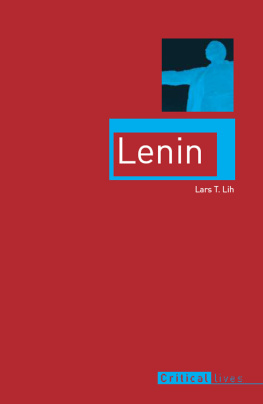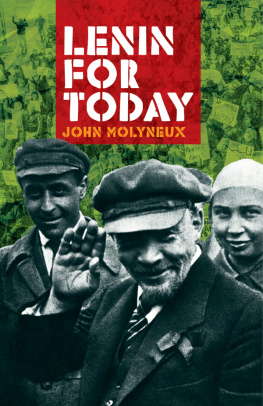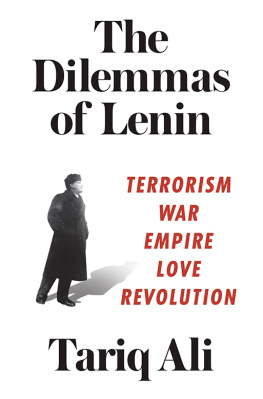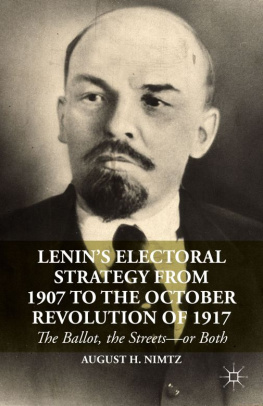LENIN
The Man Behind the Mask
Ronald Clark

1
The Boy from the Volga
From the Novyi Venets or New Summit and the Staryi Venets or Old Summit, each rising some 400 feet above the central stretches of the River Volga, in 1870 it was possible to look down on a peaceful landscape dominated by the town of Simbirsk. Its 30,000 inhabitants were served by no railway; only poor roads linked it with the rest of Russia or even with the port of Astrakhan at the mouth of the Volga more than 600 miles to the south. Apple and cherry orchards covered much of the rolling country that stretched across the immensities of Russia, and at night there could be heard the song of numerous nightingales. Here, in surroundings that had changed little over the centuries, Vladimir Ilyich Ulyanov, later known to the world as Lenin, was born in April 1870 10 April by the Julian calendar then used in Russia, 22 April by the Gregorian calendar of Europe which was twelve days ahead in the nineteenth century, then thirteen days ahead until 1 February 1918 when Russian dating was brought into line with Western usage.
On 16 April the boy was baptized in the local church of St Nicholas, his parents being described as and his lawful wife Maria Alexandrovna of the Orthodox Faith. His first name, often used in the affectionate form Volodya, was taken from the saint who had converted Russia in the tenth century to the Eastern Orthodox Church, while vladi-mir means rule the world.
[his mother] than I discovered the secret of Vladimir Ilyichs charm, a friend was later to say.
Lenins parents had much in common, notably a respect for hard work, but in many ways they differed considerably. Ilya Nikolayevich was a practising member of the Russian Orthodox Church; his wife Maria sometimes accompanied him to services but did so more out of duty than conviction, being of a basically sceptical nature. Quite as important was the difference in emphasis between the fathers dedication to the spread of education in general, and the mothers dedication to the care and education of her own children. Both were to affect Lenins upbringing, the first by pushing his father some way up the professional ladder, the second by ensuring that at school he was regularly at the top of his form and that he was subsequently able to romp through his professional studies in less time than most young men.
Details of Lenins comfortable if not wealthy middle-class background are not easy to come by, and for reasons which are highlighted in more than one study of his early days..
Attempts to trace the Ulyanov family tree further back towards its roots have brought suggestions that Lenin had Jewish blood; some attention has focused on his maternal grandfather, Dr Aleksandr Dmitriyevich Blank, who has been described as a converted Odessa Jew. This has been denied by other researchers, but no evidence to settle the question has come from the Russian archives, voluminous as they are on the background to Lenins life, which in itself can be considered suspicious. The idea of a Jewish root somewhere below Lenins family tree was later nourished by those holding anti-Jewish or anti-revolutionary views, and with the geographical and ethnographic circumstances of his forebears such a possibility would be difficult to disprove. However, the idea would not have been given such weight but for the rise of the Nazis who found it useful when elaborated by Hermann Fest in his Bolshevismus und Judentum: Das jdische Element in der Fhrerschaft des Bolshevismus (Berlin; Leipzig, 1934).
What remains undoubted is the intellectual quality of Lenins parents, particularly of his father for whom in 1854 Lobayechevsky secured a post as teacher of physics and mathematics in the Dvoriansky Institut, an institute for the nobility in Penza. It was here that Ilya Nikolayevich met Maria Blank whom he married in 1863. Soon afterwards he left the Penza Institute for the Gymnasium at Nizhni Novgorod (renamed Gorky in 1932). There followed six years of academic life which he then abandoned to become an inspector of schools.
Ulyanovs territory as inspector was the guberniya (province) of Simbirsk and he and his wife moved to its main town of the same name in the autumn of 1869. Their first child, Anna, had been born in 1864; their first son, Aleksandr, also known as Sasha, two years later. A second daughter, Olga, was born in 1868 and died the same year. Maria was again pregnant when the family moved to Simbirsk where Vladimir was born in 1870, to be followed by a second Olga in 1871, Nikolay, born and died in 1873, Dmitri in 1874, and Maria, also known as Manyasha, in 1878.
The empty steppes among which the children were brought up, and through which flowed the mile-wide Volga, lay some 650 miles from Moscow and nearly 1,500 miles to the south-east of St Petersburg, the centre of revolutionary emotion during the nineteenth century and the capital of Russia until after the Revolution of 1917. Yet the area had not escaped the upheavals that from the start of recorded history had regularly drenched the country in blood.
In 1671 a major battle was fought in Simbirsk, the revolutionary Don Cossack, Stenka Razin, defeated, 800 of his followers hanged, and Razin handed over to the Tsar by more conservative colleagues for execution in Moscow. Repercussions from revolutions and attempted revolutions continued to reach as far as the Volga from the days of Emilian Pugachev, who called himself Tsar Peter III and was executed in 1775, to the early years of the nineteenth century, which in 1825 witnessed the failure of the Decembrists to seize power. The abolition of serfdom in 1861 followed the humiliations of Russia in the Crimean War but failed to assuage general discontent constantly bubbling beneath the surface; the second half of the nineteenth century saw the rise to fame of at least three pre-Marxian revolutionaries under whose influence Lenin was to grow up: Mikhail Aleksandrovich Bakunin (181476), Aleksandr Ivanovich Herzen (181270) and Nikolay Gavrilovich Chernyshevsky (182889). During Lenins early years, two of his later comrades also marched into history: Vera Ivanovna Zasulich, who in 1878 fired at and wounded the chief of the St Petersburg police, but was acquitted by a jury and then protected from rearrest by the crowd; and Georgy Valentinovich Plekhanov, an early exponent of philosophical Marxism, who in 1876 addressed workers and students in the Kazan square, St Petersburg, at what became one of the first workers demonstrations in Russia. Seven years later Plekhanov, Vera Zasulich and Pavel Borisovich Akselrod, a carpenter who was twice forced to leave Russia because of his political views, and who had been converted to Marxism by his working experiences, founded the Liberation of Labour Group outside Russia, one of the first bodies with which Lenin was to become associated. He was also an editor of Lenins Iskra (The Spark). Plekhanov, who emigrated from Russia in 1880, quickly became a leading theoretician of the Marxist movement. During the early years of the twentieth century his view of Lenin varied between extreme support and extreme opposition. He criticized terrorism, derided many of the policies that Lenin advocated as he created what became the Bolshevik Party, and strongly denounced Lenins determined opposition to the war that broke out in 1914.
The complex relationships that these attitudes produced were all subsidiary to Lenins overwhelming and dedicated support for a revolution in Russia and the spread of Marxism throughout the world, aims to whose success he devoted his life; however bitter the arguments with Plekhanov, or with other supporters of drastic change in Russia, his conviction of the overriding need for revolution was continually seeping into him by a process of intellectual osmosis. The later claim by his sister Maria was true: was one of revolutionary struggle and his private life was part of that struggle, part of his labour on behalf of the cause of the proletariat.


